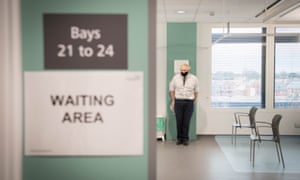November lockdown decision has been followed by a series of flip-flops and 11th-hour announcements

The prime minister announced a third national lockdown in England on Monday evening, after calls for tougher Covid controls. Photograph: WPA/Getty Images
14 October 2020: Johnson dismisses calls from the Labour leader, Keir Starmer, for a “circuit-breaker” lockdown, telling MPs: “Opportunism is the name of the game for the party opposite.”
31 October: The prime minister announces a new four-week lockdown in England, shortly after Wales began a two-week circuit-breaker.
2 November: Boris Johnson promises Tory MPs that lockdown restrictions will end on 2 December “without a shred of doubt”.
9 November: Wales ends its two-week lockdown.
13 November: The UK announces a shorter quarantine for travellers through a “test and release” programme from 15 December.
23 November: The government publishes a toughened three-tier system, which now requires areas in the highest tier to close pubs and restaurants.
2 December: National lockdown ends and new tier restrictions are enforced. London and much of the south-east, where cases are rapidly rising, are placed in tier 2, with restaurants and pubs open for those in the same household to eat indoors and households able to mix outdoors.
14 December: Ahead of the formal review date, London, most of Essex and parts of Hertfordshire move into tier 3 as Matt Hancock says a new variant of Covid-19 is causing the virus to spread faster. The British Medical Journal and Health Service Journal publish a joint editorial calling on the government to cancel plans for five-day Christmas mixing of up to three households.
15 December: Downing Street briefs that Johnson will face down calls to limit Christmas restrictions. Gove meets the devolved administrations and agrees to keep Christmas plans as previously decided.
16 December: Johnson tells a No 10 press conference: “I want to be clear, we don’t want to ban Christmas, to cancel it … I think that would be frankly inhuman and against the instincts of many people in this country … Nor do we want to criminalise plans people may have made for some time.”
19 December: Johnson announces new tier 4 restrictionsacross the south-east of England, where households are banned from mixing at Christmas and non-essential shops closed. Households in lower tiers can now mix only on Christmas Day. Nicola Sturgeon announces that the whole of Scotland will enter the country’s toughest level 4 restrictions, and travel to and from the rest of the UK is banned.
20 December: Countries around the world announce restrictions on travel from the UK in response to the new variant.
22 December: Sage scientists privately warn the government against schools reopening as planned
28 December Mounting pressure for schools to close comes from unions and teachers. Allies of the education secretary, Gavin Williamson, brief that he is mounting a “rearguard action”.
30 December The government confirms tier 4 restrictions will be extended in England to all of the north-east, Greater Manchester, large parts of the Midlands and south-west, meaning almost eight in 10 people will be in the toughest restrictions from New Year’s Eve. The rest of the country, except for the Isles of Scilly, moves into tier 3. Williamson announces that schools in some English areas with high levels of Covid-19 will remain closed after the Christmas holiday for the first week or two of January, reversing his previous stance.
3 January 2021: Johnson says parents in England should send primary school children to school on Monday morning, telling the BBC’s Andrew Marr Show: “Schools are safe. It is very, very important to stress that and the risk to kids, to young people … to staff is very small.”
4 January: Johnson says there is “no question” that the government will need to toughen coronavirus restrictions to cope with fast-rising infection levels. Amid mounting calls for a major change of strategy, the prime minister holds a press conference in which he announces a third national lockdown in England expected to last until mid-February.

Leave A Comment